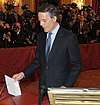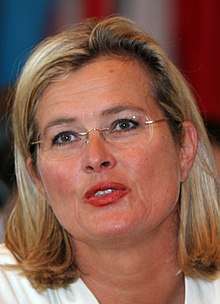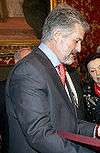College of Europe
The College of Europe (French: Collège d'Europe) is a postgraduate institute of European studies with its main campus in Bruges, Belgium, and a smaller campus in Warsaw, Poland. The College of Europe in Bruges was founded in 1949 by leading historical European figures and founding fathers of the European Union, including Salvador de Madariaga, Winston Churchill, Paul-Henri Spaak and Alcide De Gasperi as one of the results of the 1948 Congress of Europe in The Hague to promote "a spirit of solidarity and mutual understanding between all the nations of Western Europe and to provide elite training to individuals who will uphold these values"[1] and "to train an elite of young executives for Europe".[2] The founders imagined the college as a place where Europe's future leaders could live and study together. It has the status of "Institution of Public Interest", operating according to Belgian law. The second campus in Natolin (Warsaw), Poland was opened in 1992.[3] The College of Europe is historically linked to the establishment of the European Union and its predecessors, and to the creation of the European Movement International, of which the college is a supporting member. Federica Mogherini, former High Representative of the Union for Foreign Affairs and Security Policy, was appointed as the Rector to start in September 2020;[4] former President of the European Council Herman, Count Van Rompuy is chairman of the board.[5]
Collège d’Europe | |
 | |
| Type | Private postgraduate institute |
|---|---|
| Established | 1949 |
| Chairman | Herman Van Rompuy |
| Rector | Jörg Monar |
Academic staff | 140 |
| Postgraduates | 420 from over 50 countries |
| Location | 51°12′39.66″N 3°13′32.89″E |
| Working languages | English and French |
| Website | www |
Students are usually selected in cooperation with their countries' ministries of foreign affairs, and admission is highly competitive. The College of Europe is bilingual, and students must be proficient in English and French. Students receive an advanced master's degree (formerly called Diploma and Certificat) following a one-year programme. Traditionally, students specialise in either European Law, European Economic Studies, or European Political and Administrative Studies; in recent years, additional programmes have been created. For much of its history the college only admitted a small number of students, although the number has increased since the 1990s.
According to The Times, the "College of Europe, in the medieval Belgian city of Bruges, is to the European political elite what the Harvard Business School is to American corporate life. It is a hothouse where the ambitious and talented go to make contacts".[6] The Economist describes it as "an elite finishing school for aspiring Eurocrats".[7] The Financial Times writes that "the elite College of Europe in Bruges" is "an institution geared to producing crop after crop of graduates with a lifelong enthusiasm for EU integration".[8] Former European Commissioner for Education Ján Figeľ described the college as "one of the most emblematic centres of European studies in the European Union".[9] The BBC has referred to it as "the EU's very own Oxbridge".[10] The college has also been described as "the leading place to study European affairs"[11] and as "the elite training center for the European Union's political class".[12] RFE/RL has referred to the college as "a Euro-federalist hot-spot".[13] The Global Mail has described its students as "Europe's leaders-in-waiting".[14] The well-connected graduates of the college are sometimes referred to as the "Bruges mafia;"[15] Schnabel and Rocca note that "many of the most successful Commission staff members are also graduates of the elite College of Europe in Bruges, Belgium, which offers a one-year master's course in European studies, and whose graduates are said to form a 'Bruges Mafia.'"[16]
Each academic year is named after a patron and referred to as a promotion. The academic year is opened by a leading European politician. The College of Europe shares several traditions with the École nationale d'administration (ENA) of France,[17] but has a more European focus. Its alumni include the former Prime Minister of Denmark Helle Thorning-Schmidt, the former Prime Minister of Finland Alexander Stubb, the former British Deputy Prime Minister Nick Clegg as well as the Minister of Foreign Affairs of Italy Enzo Moavero Milanesi, several of whom have also been professors at the college. Many of its alumni go on to serve as diplomats and senior civil servants in European institutions.
History
The College of Europe was the world's first university institute of postgraduate studies and training in European affairs. It was founded in 1949 by leading European figures, such as Salvador de Madariaga, Winston Churchill, Paul-Henri Spaak and Alcide De Gasperi, in the wake of the Hague Congress of 1948, that led to the creation of the European Movement, and is frequently considered the first federal moment in European history. They imagined a college where Europe's future leaders, some from countries only a short while before at war with each other, could live and study together.[1] In particular, it was Spanish statesman Salvador de Madariaga the one who advocated for the creation of a College of Europe, where graduates from different European states could study together, as a way to heal the wounds of the World War II. Although the cultural resolution adopted at the end of the Congress did not include explicit references to the establishment of a College of Europe and only advocated for the creation of a 'European Cultural Centre and a European Institute for Childhood and Youth Questions', the idea of establishing a European University was put forward by Congress attendees immediately after the Congress.[18]
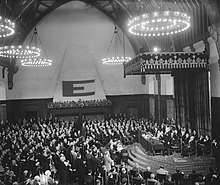
A group of Bruges citizens led by the Reverend Karel Verleye succeeded in attracting the college to Bruges. Professor Hendrik Brugmans, one of the intellectual leaders of the European Movement and the President of the Union of European Federalists, became its first Rector (1950–1972).[19] John Bowie, Professor of Modern History at Oxford University, was appointed Director of the first session held by the college, in 1949.[20] Henri van Effenterre, who was a Professor of Ancient History at Caen University and Alphonse de Vreese, International Law professor at the University of Ghent, also contributed to that first session, who was celebrated at the Gothic Chamber of Bruges Town Hall.[20] The topic of that first session taught to the first promotion of the college (frequently called préparatoire, for it is the only promotion not named after any prominent figure) was 'Teaching history and the development of a European spirit in universities'.[21]
In the decades that followed the establishment of the institution students were hosted at the Navarre Hotel in the historic center of Bruges until 1981.[22] During those first decades of existence the number of postgraduate students was small, though it was increased progressively (from 22 students in 1949 to almost 140 in 1980). The number of enrolled students has increased significantly since the 1980s.[23] Meanwhile, the College consolidated itself as an institution specialized in studies focused on the newly established European Communities (the college was founded in 1949, before the communities were established).
In 1988, British Prime Minister Margaret Thatcher delivered her famous 'Bruges speech' at the College of Europe,[24] as part of the opening ceremony for that academic year. In her speech, which has been considered by many the cornerstone of the eurosceptic movement that eventually led to Brexit,[25] Thatcher laid down her vision for Europe, claiming that the European Community should remain an economic union, refusing the claims for a closer political integration made by Commission President Jacques Delors. As a part of her speech, Ms. Thatcher also referred to the College as an institution that 'plays a vital and increasingly important part in the life of the European Community'.[24]
After the fall of communism, and in the wake of the changes in Central and Eastern Europe, the College of Europe campus at Natolin (Warsaw, Poland), was founded in 1992 with the support of the European Commission and the Polish government. The Natolin Campus is located in historic palace, part of a 120-hectare park and nature reserve.[26] According to former President of the European Commission Jacques Delors, "this College of Europe at Natolin is more than the symbol of Europe found once again, it is the hope represented in this beautiful historic place. The hope that exchanges can multiply for greater mutual understanding and fraternity".[26] The establishment of a second campus in eastern has been frequently regarded as part of an effort aiming to train young students from eastern countries under the auspices of eastern enlargement.[27] Since the establishment of that second campus in Poland, the college operates as 'one College – two campuses,' and what was once referred to as the 'esprit de Bruges', is now known as the 'esprit du Collège'.
In 1998, former students of the college set up the Madariaga – College of Europe Foundation, which is presided over by Pierre Defraigne.[28] The foundation has among its objectives 'working to promote citizen's ownership of the European democratic space', as well as promoting 'European responses' for contemporary challenges.[29] The name choice when the foundation was established was not casual: Salvador de Madariaga is regarded as the main founder of the college. A bust of him presides over the College library, and one of the halls in Garenmarkt is named after him.
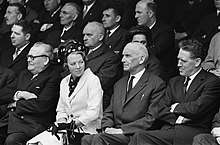
The College of Europe originally had no permanent teaching staff; the courses were taught by prominent academics and sometimes government officials from around Europe.[30] Especially in the last couple of decades, the college has increasingly employed professors and other teaching staff on a permanent basis.
In 2012 the College of Europe became a supporting member of the European Movement International, which noted that the European Movement is "closely linked to the creation of the College of Europe".[31] The academic year 2018-2019 marked the first time in which a promotion was named after a College alumnus, Manuel Marín, Spanish Statesman, EU Commissioner and acting President of the Commission (known as the 'father of the Erasmus Programme'), who had passed away early that year. In 2015, three years before the election of Marín as Patron, former Finish Prime Minister Alexander Stubb was the first College alumnus to be invited to be the Orateur at the opening ceremony of that academic year.
Former Spanish Minister and Cabinet Spokesperson Íñigo Méndez de Vigo, 9th Baron of Claret, served as chairman of the board from 2009 to 2019; in 2019 former Prime Minister of Belgium and President of the European Council Herman, Count Van Rompuy was appointed the new chairman of the board.[5] In May 2020 Federica Mogherini, former High Representative of the Union for Foreign Affairs and Security Policy and Vice-President of the European Commission, was appointed rector of the College, the first high ranking political figure from the European Commission to hold the post.[32]
Traditions
Throughout its seven decades of history, the College of Europe has developed many different traditions. Some are shared with the École nationale d'administration (both the College and the École name their promotions after a historical figure, being in the College of Europe an outstanding European figure, which is called 'patron'[33]). Besides the choice of a prominent historical figure to name each promotion, each academical year is traditionally inaugurated by a prominent European figure. Furthermore, each year, College of Europe students are named honorary citizens of Bruges prior to their departure,[34] in an enduring display of the close ties existing between the College and the city that hosted it more than seventy years ago. Another trading dating back to the first years of existence of the college is the visit to Flanders fields during the first weeks of the academic year: incoming students are shown the battlefields and graveyards of World War I so as to understand the way in which the bloody conflicts of the 20th Century paved the way for European integration. During that visit, students lay a floral tribute at the Menin Gate war memorial in Ypres.[35]
Regarding student life, many traditions have been developed throughout the years. During Christmas, a Christmas tree is placed in each student residence, and students compete by trying to steal and bring to their own residences as much Christmas trees as possible. Another traditional celebration during the academic year is the boat race in the canals of Bruges, frequently held in June. All residences build their own amateur boats, which are manned by College students. Last, since 2010 the Hendrik Brugmans Cup, an annual football tournament, is held by College students. Football teams from both students and alumni participate, each representing a promotion. The tournament is named after Hendrik Brugmans, first rector of the college.
Campuses
Bruges campus
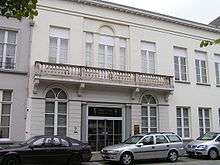
The Bruges campus is situated in the centre of Bruges since its establishment in 1949, which was appointed European Capital of Culture in 2002. Bruges is located in the Flemish Region of Belgium, a Dutch-speaking area, although the college does not use Dutch as one of its working languages.
It consists of the following campus buildings:
Dijver
The Paul Henri Spaak Building (named after the renowned Belgian socialist politician, and popularly known as Dijver) is college's main administrative building on the Bruges campus. It hosts the college's main reception, some of its offices, classrooms and the library. Located on one side of the Dijver Canal, a white classic façade stands at the front of the main building (where the European, Belgian, Flemish and Brugeois flags hang together), while there is a garden in its back side. The garden is used by the students, who frequently spare their break time there due to its proximity to the library (which is connected to the main building by a corridor). Signed portraits of all the orateurs hang in the walls of the main corridor of the building.
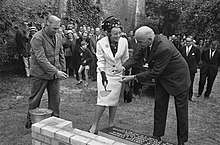
The library building was built in 1965. Princess Beatrix of the Netherlands (later Queen Beatrix) laid the first stone of the library in a special commemorative event. Almost three decades after its completion, the library was reformed and enlarged (the works were completed in 1992). Most of the library fonds are devoted to European Studies, together with law, economics, and political and administrative sciences.[36] Access to the library is restricted to College students and academic staff. A bust of Salvador de Madariaga presides over the library main reading hall.
Verversdijk
Following the increase in the number of students attending the College each year, the College of Europe (with the support of different entities and institutions, including the Flemish Government and the City of Bruges[37]) reformed the 17th century protected monument[38] of Verversdijk to provide additional auditoria, teaching rooms and offices for academics, research fellows and staff; and to extend its activities. The reform was led by the office of Xaveer De Geyter Architects (XDGA), and the project was nominated to the Mies van de Rohe award in 2009.[39] The Verversdijk premises began to be used by College students in 2007. Besides its academic and administrative use throughout the course, a cocktail is served in its garden to each promotion, following their graduation ceremony at St. Walburga Church (Bruges).
The historical site of Verversdijk owes its name to fact that the owners of the houses standing there at medieval times were dyers who used wool traded with Scotland, as the area was populated by several Englishmen during the Middle Ages.[40] During the Spanish rule, it hosted the schooling houses and the monastery established by the Jesuits in the 17th century.[41] In 1792, the monastery auditorium was used as a meeting place by the Jacobin Club.[38] The main monastery wing (dating back to 1701, and whose façade was plastered in 1865[42])) was built along the canal, and was used as an athenaeum since 1851.[38] its long inner corridor is an outstanding example of the rococo style in Bruges, whereas, the ashlar staircase is also an element of artistic relevance. The attic of the building, with a total length of 45 meters and a surprisingly well-preserved oak canopy, is currently used as a study room. During the First World War occupation of Belgium, the attic was used as a sleeping room for soldiers of the German Marine.[42]
The monastery wing was also home to the Museum of Modern Painting from 1898 to 1931[43] (when they were transferred to the newly-established Groeninge Museum[44]). Since 2008, following and agreement between the College and the Groeninge Museum, the college hosts the 'Extraordinary Groeninghe Art Collection',[45] an installation of contemporary works of art featuring international artists at Verversdijk's hallways. Members of the Groeninghe Art Collection meet every two months at the College so as to discuss art, attend lectures by art experts and consider possible purchases.[45]
In March 2014 the so-called 'China Library' was established at the Verversdijk compound.[46] A project sponsored by the Information Office of the State Council of the Chinese Government,[47] the library (decorated in Chinese style) is home to ten thousand books and documents in more than six languages,[46] as frequently hosts events related with Sino-European relations or the Chinese culture.
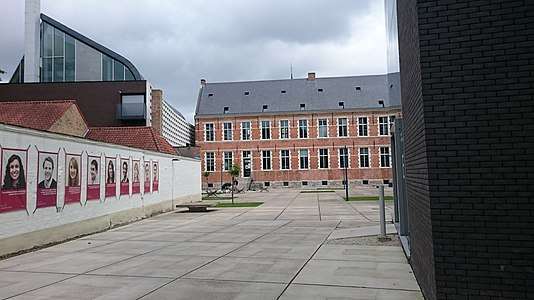 View of Verversdijk Campus
View of Verversdijk Campus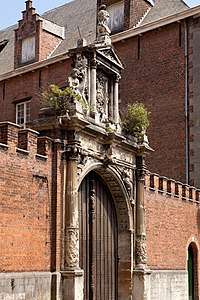 Old entrance to the Verversdijk buildings
Old entrance to the Verversdijk buildings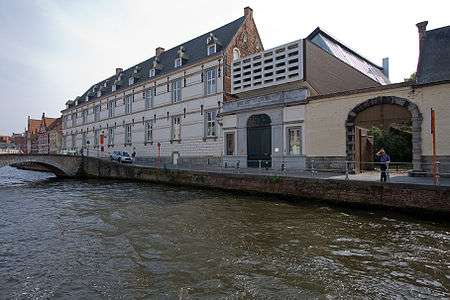 New entrance to the Verversdijk buildings
New entrance to the Verversdijk buildings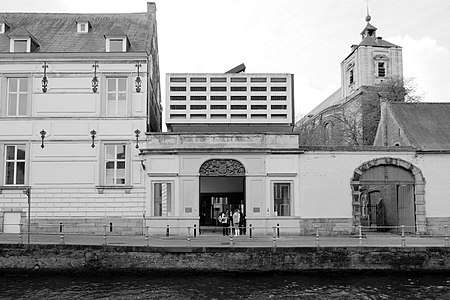 The main monastery wing as seen from the Canal
The main monastery wing as seen from the Canal
Garenmarkt
The Hotel Portinari in Garenmarkt 15 with its classical façade was formerly home to Tommaso Portinari, the administrator of the Florentine "Loggia de Medici" in the 15th century in Bruges. It contains eleven apartments for professors and forty student rooms, two "salons" in 19th-century style, the "salon du Recteur" with 18th-century wall paintings and a modern "Mensa" for students.
Residences
The college has a system of residences in the centre of Bruges and not far from the Dijver where the main administrative and academic building and the library are situated. None of the residences lodges more than 60 students so that each residence in fact has its own small multinational and multicultural environment.[48]
- Biskajer;
- Garenmarkt;
- Gouden Hand;
- Oliebaan;
- Oost Gistelhof;
- Oude Zak;
- Sint-Joris;
- Karel Verleye Residence (Wispeltuin);
Natolin campus
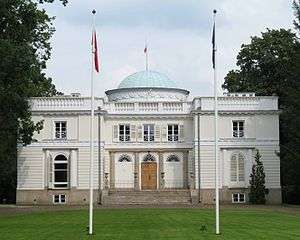
The Natolin Warsaw campus of the college was established in 1992 in response to the revolutions of 1989 and in anticipation of the European Union's enlargement.
Today, the Natolin campus is part of a 120-hectare historical park and nature reserve—formerly the Royal hunting palace of Natolin—situated in the southern part of Warsaw about 20 minutes by metro from the city centre. The Natolin European Centre Foundation takes care of the complex and has conducted restoration of the former Potocki palace, making it available for the college.
The old historical buildings, including the manor house, the stables and the coach house, were converted to the needs of modern times and new buildings were constructed in a style keeping with the harmony of the palace and its outlying park.
Academics
Research
The College houses several academic chairs as well as the Global Competition Law Centre. It publishes several books every year, four series of working papers and an academic journal called Collegium, devoted to the European integration process.
Cooperation
Since the early 1980s, the college has developed a relevant consultancy activity, especially in the field of analysis of EC law. Based on the college's first experiences with service contracts, notably in the field of codification of European Law and related to the implementation of the Internal Market, the Development Office was created to participate in tender procedures and to manage the teams of researchers working under these service contracts.
Over the past 10 years, the College of Europe has been organising cooperation projects funded by various EU programmes, either in consortia with academic partners, companies and law firms, or on its own account. Under TEMPUS programmes, projects for curriculum building in European Studies were set up. With the EU's PHARE, TACIS and CARDS funding the College provided professional training and consultancy in EU affairs in nearly all applicant countries, in Russia and in the CIS. In addition the Office has also involved the college in similar co-operation projects in the framework of the MED-CAMPUS Programme and more recently with EuropeAid funding in Latin America and Asia. The Development Office is now involved in professional training projects and European Studies programmes held in Europe and abroad.
The college has started to organise professional training courses and seminars on European integration issues with partners such as professional, trade and other associations, private companies and administrations. Officials from the European institutions and national administrations have attended tailor-made training programmes.
Conferences
International conferences have been held at the College since it was founded. These events have become fora for informed discussion on topics that are complementary to the academic expertise of the college, like the annual conference on Humanitarian Law, organised in cooperation with the International Committee of the Red Cross. It is also common to have several European prime ministers deliver a speech during the academic year.
Courses
The one-year programme lasts from September until the end of June and is taught in English and French. It includes lectures, research seminars, workshops and meetings with external specialists and various language courses. To be awarded the degree, students must take oral and written examinations at the end of each semester, and submit a 15 ECTS master's thesis in English or French. The thesis gives students the opportunity to undertake individual research, conducted primarily in the second semester, under the supervision of a faculty member. The programmes are enriched by study trips to the European institutions and, for students at Natolin (Warsaw), also to neighbouring countries. Due to the college's extensive network of contacts, students have the opportunity to meet and discuss with policy-makers, practitioners and representatives of the business community throughout their year at the college.
From 1949 to the 1990s, students in Bruges enrolled in three programmes:
- European Economic Studies (i.e., studies of international economics with an emphasis on the EU)
- European Legal Studies (i.e., studies of European law)
- European Political and Governance Studies (i.e., studies of political science and public administration focusing on the EU)
In recent years, other programmes have been created:
- European International Relations and Diplomacy Studies
At Natolin (Warsaw) campus, the study programme European Interdisciplinary Studies offers four majors: EU Public Affairs and Policies, The EU in the World, The EU and its Neighbours and European History and Civilisation.
The academic programmes of the College of Europe are accredited by the Dutch-Flemish Accreditation Organisation (NVAO). Each study programme corresponds to a total of 66 credits (ECTS).
Annual intakes are highly selective and student selection takes place in the Spring, usually in association with the foreign affairs ministries of their respective countries of origin. The offered academic programmes typically require a university degree in economics, law, political science or international relations plus advanced knowledge of the working languages of the college.
Admissions
Application may be made to national selection committees or by direct application to the College of Europe for individuals from a country where no selection committee exists.[49] As of 2014, there are 28 national selection committees.[50]
Degrees
The College of Europe in Bruges traditionally awards three degrees, one in European Economic Studies, one in European Legal Studies and one in Political and Governance Studies. Since the 1990s the college has also established some new degrees.
The College of Europe in Natolin awards the degree of Master of Arts in European Interdisciplinary Studies.
The current degrees awarded by the College of Europe in Bruges are:
- Master of Arts in European Economic Studies (MEES)
- Master of Arts in EU International Relations and Diplomacy Studies
- Master in European Legal Studies (LLM)
- Master of Arts in European Political and Governance Studies
- Master of Arts in Transatlantic Affairs (MATA)
Currently, the master's degree requires a 15 ECTS master's thesis in English or French, while the rest of the academic year consists of courses and lectures.
The Master of Arts in Transatlantic Affairs (MATA) programme was inaugurated in 2017. It is the first-ever two-year programme of studies at the College of Europe. Offered together with The Fletcher School of Law and Diplomacy (Tufts University, Medford, MA, USA), the programme leads to a joint diploma. Students spend one year at each institution, and can start the programme on either side of the Atlantic. They can choose to follow one of five study tracks (Economic Studies (Bruges); International Relations and Diplomacy (Bruges); Interdisciplinary Studies (Natolin); Legal Studies (Bruges); Political and Governance Studies (Bruges)). The first year of studies is entirely dedicated to coursework, including multidisciplinary courses on transatlantic affairs. During their second year, students in the MATA programme do a high-level internship as well as one semester of coursework culminating in the submission of a master's thesis. The MATA programme leads to 120 ECTS points and is offered in English.
Until the 1980s, the master's degree was officially known as the Certificate of Advanced European Studies (French: Certificat de Hautes Études Européennes) followed by the specialisation (law, economics or political and administrative studies). As part of European standardisation, the degree was renamed into the master's degrees listed above.
Organisation
Governing bodies
- Administrative Council
The Administrative Council, presided by Mr Herman Van Rompuy, former President of the European Council and former Prime Minister of Belgium, includes representatives of the countries hosting the two campuses in Bruges (Belgium) and Natolin (Warsaw) and of European governments. It is the highest decision-making authority, and is responsible for the approval and implementation of the college's objectives and activities of the college on the rector's proposal.
- The Executive Committee
The Executive Committee exerts the delegations which were entrusted to him by the Administrative Council. Reporting to the Administrative Council, the it ensures the sound financial and administrative management of the college. The Rector & Vice-Rector Rector Jörg Monar directs and coordinates the college's activities, and is assisted by the Vice-Rector, Ewa Ośniecka-Tamecka, who is responsible for the day-today administration of the campus in Natolin (Warsaw).
- The Academic Council
The Academic Council represents the academic community of the College of Europe and ensures the maintenance and development of high level teaching activities and research. It is chaired by the Rector.
Rectors
The rector directs and coordinates the college's activities.
- Hendrik Brugmans (1906–1997) (1949–1971)
- Jerzy Łukaszewski (°1924) (1972–1990)
- Werner Ungerer (°1927) (1990–1993)
- Gabriel Fragnière (°1934) (1993–1995)
- Otto von der Gablentz (1930–2007) (1996–2001)
- Piet Akkermans (1942–2002) (2001–2002)
- Robert Picht (1937–2008) (a.i. 2002–2003)
- Paul Demaret (2003–2013)
- Jörg Monar (2013–present)[51]
Vice rectors
The vice rector is responsible for the day-today administration of the Natolin (Warsaw) campus.
- Ettore Deodato (1993)
- David W. P. Lewis (1994–1996)
- Jacek Saryusz-Wolski (1996–1999)
- Piotr Nowina-Konopka (1999–2004)
- Robert Picht (a.i. 2004–2005)
- Robert Picht (2005–2007)
- Ewa Ośniecka-Tamecka (2007– present)[52]
Presidents of the Administrative Council
- Salvador de Madariaga (1950–1964)
- Jean Rey (1964–1974)
- François-Xavier Ortoli (1974–1975)
- Daniel Coens (1985–1990)
- Manuel Marín (1990–1995)
- Jacques Delors (1995–2000)
- Jean-Luc Dehaene (2000–2009)
- Íñigo Méndez de Vigo (2009 – 2019)[53]
- Herman Van Rompuy (2019–present)[54]
Promotions
Academic years at the College are known as promotions. Each promotion is named after an outstanding European, referred to as the promotion's patron. The College of Europe shares this tradition with the French École nationale d'administration (ENA).
The opening ceremony each year is presided over by a prominent politician, referred to as the Orateur; they have included Angela Merkel, David Miliband, Jean-Claude Juncker, Javier Solana, José Manuel Barroso, Valéry Giscard d'Estaing, Juan Carlos I of Spain, Margaret Thatcher and François Mitterrand. Being invited as the college's Orateur is considered a high honour.[55]
People
Notable alumni
Many former students of the college, referred to as anciens (French for alumni), have gone on to serve as government ministers, members of various parliaments, diplomats and high-ranking civil servants and executives.
A list of all alumni from 1949 to 1999 is included in the book The College of Europe. Fifty Years of Service to Europe (1999), edited by Dieter Mahncke, Léonce Bekemans and Robert Picht.
Alumni of note of the College of Europe (from 1949) include:
- Gaetano Adinolfi, former Deputy Secretary General of the Council of Europe
- Alberto Alemanno, Professor of Law at New York University School of Law and HEC Paris,[59] CEO of eLabEurope[60]
- Frans Alphons Maria Alting von Geusau, Dutch legal scholar and diplomat
- Bernadette Andreosso-O'Callaghan, French-Irish economist, Jean Monnet Professor of Economics at the University of Limerick
- Peter Arbo, Norwegian academic
- Árni Páll Árnason, Icelandic Minister of Economic Affairs. Promotion Mozart.
- Ioanna Babassika, Greek human rights lawyer, member of the Committee for the Prevention of Torture
- María Angeles Benítez Salas, Spanish European civil servant, director-general of the Directorate-General for Agriculture and Rural Development
- Ledi Bianku, judge at the European Court of Human Rights
- Margunn Bjørnholt, Norwegian sociologist
- Iwo Byczewski, former Polish Deputy Foreign Minister (1991–1995), Ambassador to Belgium and Permanent Representative to the European Union
- Geert Van Calster, Belgian lawyer and legal scholar
- Sofie Carsten Nielsen, Danish Minister for Higher Education and Science. Promotion Aristotle
- Franz Ceska, Austrian Ambassador to Belgium and France, Permanent Representative to the United Nations in Geneva
- Poul Skytte Christoffersen, Danish Permanent Representative to the European Institutions, Special Advisor to The Right Honourable Catherine Ashton, Baroness Ashton of Upholland, the High Representative of the Union for Foreign Affairs and Security Policy
- Nick Clegg, British politician, former Deputy Prime Minister of the United Kingdom, leader of the Liberal Democrats and member of the European Parliament
- Luc Coene, Belgian economist and Governor of the National Bank of Belgium (NBB)
- Karl Cox, Vice President of the Oracle Corporation
- Martin Donnelly, British civil servant
- Niels Egelund, Danish diplomat, former Permanent Representative to NATO and Ambassador to France
- Jonathan Faull, Director General for the Internal Market and Services
- Mary Finlay Geoghegan, Justice of the Supreme Court of Ireland.
- Nigel Forman, British MP and Minister of Higher Education (1992), a member of the Conservative Party
- Gabriel Fragnière, Swiss academic
- Louise Fréchette, Deputy Secretary-General of the United Nations
- Francesco Paolo Fulci, former Permanent Representative of Italy to the United Nations (1993–1999), currently serving as President of Ferrero SpA
- Otto von der Gablentz, German diplomat and academic
- Luis Garicano, Professor of Economics and Strategy at the London School of Economics
- Miriam González Durántez, Spanish lawyer and wife of Nick Clegg
- Fiona Hayes-Renshaw, Irish academic, visiting professor at the college since 2001
- Chris Hoornaert, Ambassador of Belgium to the Netherlands
- Simon Hughes, British politician and Liberal Democrat Member of Parliament
- Marc Jaeger, judge at the General Court of the EU
- Josef Joffe, German editor and publisher of Die Zeit and adjunct professor of political science at Stanford University
- Claudia Kahr, judge at the Austrian Constitutional Court
- Alison Kelly, Irish ambassador to Israel
- Stephen Kinnock, Director at the World Economic Forum
- Berno Kjeldsen, Danish ambassador
- Lars-Jacob Krogh, journalist
- Brigid Laffan, Director of the Robert Schuman Centre for Advanced Studies at the European University Institute
- Jo Leinen, German member of the European Parliament, former president of the Union of European Federalists
- Christian Lequesne, Professor of European Politics at Sciences Po, the College of Europe and the London School of Economics
- Leif Terje Løddesøl, former Chair of Statoil
- Sylvie Lucas, Luxembourg's ambassador to the United Nations and president of the United Nations Economic and Social Council (ECOSOC) (2009–2010)
- Aude Maio-Coliche, Ambassador, Head of the EU Delegation to Venezuela
- Manuel Marín, former President of the European Commission
- Thomas Mayr-Harting, Ambassador, Head of the Delegation of the European Union to the United Nations
- Ian McIntyre, British journalist
- David McWilliams, Irish economist, journalist and documentary-maker
- Monique Meche, Vice President, Amazon.com
- Holger Michael, German ambassador
- Enzo Moavero Milanesi, Minister of Foreign Affairs of Italy
- Goenawan Mohamad, Indonesian poet
- Juan Moscoso del Prado, Spanish socialist Member of Parliament, spokesman in the European Union Committee
- Jon Ola Norbom, former Minister of Finance of Norway
- Jim Oberstar, member of the United States House of Representatives
- Christina Orisich, Deputy Director of the Geneva Centre for Security Policy
- Mary O'Rourke, barrister
- David O'Sullivan (civil servant), Chief Operating Officer of the European Union's diplomatic corps, former Secretary-General of the European Commission and Director General for Trade
- Valerie Plame, former United States CIA Operations Officer
- Ursula Plassnik, former Foreign Minister of Austria, a member of Austrian People's Party (European People's Party)
- Nikola Poposki, Macedonian Minister for Foreign Affairs and former Ambassador of the Permanent Mission of the Republic of Macedonia to the European Union
- Xavier Prats Monné, EU official
- Torolf Raa, former Norwegian ambassador
- Carine Van Regenmortel, Belgian corporate lawyer
- Philippe Régnier, Professor at the Graduate Institute of International and Development Studies and the University of Ottawa
- Prince Albert Rohan, former Permanent Secretary of the Austrian Foreign Ministry, UN envoy
- Margaritis Schinas, Chief Spokesperson of the European Commission and Deputy Director-General for DG Communication
- György Schöpflin, a Hungarian academic and politician, Member of the European Parliament for Fidesz and the European People's Party
- Guy Spitaels, Belgian politician and Minister-President of Wallonia
- Alexander Stubb, Finnish Minister for Foreign Affairs, a member of politician of the National Coalition Party (European People's Party)
- Helle Thorning-Schmidt, Prime Minister of Denmark and leader of the Social Democrats (Denmark)
- Didrik Tønseth, former Norwegian ambassador
- Count Ferdinand Trauttmansdorff, Austria's ambassador to Prague
- Loukas Tsoukalis, Jean Monnet Professor of European Integration at the University of Athens and President of the Hellenic Foundation for European and Foreign Policy
- Andrew Tyrie, Member of Parliament (MP) for Chichester and Chairman of the Treasury Select Committee, a member of Conservative Party
- Helmut Türk, judge at the International Tribunal for the Law of the Sea, former Ambassador of Austria to the United States
- Werner Ungerer, German diplomat, Permanent Representative to the European Communities from 1985 to 1990 and rector of the college from 1990 to 1993
- Robert Verrue, Director-General for Employment of the European Commission
- Alexander Walker, British film critic
- Helen Wallace, Lady Wallace of Saltaire, British expert in European studies and Emeritus Professor at the London School of Economics and Political Science
- Bruno de Witte, Professor of EU Law at the European University Institute
- Marc van der Woude, judge at the European Court of Justice
- Adrien Zeller, former French minister in the second Jacques Chirac government (1986–1988), former President of Alsace Regional Council, a member of the Union for a Popular Movement
- Jaap de Zwaan, Dutch diplomat and negotiator of several European treaties, Professor of EU Law at the Erasmus University Rotterdam
Alumni of note of the College of Europe in Natolin, Poland (from 1993) include:
- Gert Antsu, Ambassador Extraordinary and Plenipotentiary of the Republic of Estonia to Ukraine
- Jarosław Domański, Ambassador Extraordinary and Plenipotentiary of the Republic of Poland to the Islamic Republic of Iran
- Marija Pejčinović Burić, Deputy Prime Minister of Croatia, Minister of Foreign and European Affairs
- Alyn Smith, Scottish member of the European Parliament
- Olesea Stamate, Minister of Justice of the Republic of Moldova
- Rafał Trzaskowski, Mayor of Warsaw, former member of the Polish Sejm, former Polish member of the European Parliament, former Polish Minister of Administration and Digitization, former Secretary of State in the Polish Ministry of Foreign Affairs
Staff
- Dominique Moïsi, co-founder and is a senior advisor of the Paris-based Institut Français des Relations Internationales (IFRI), Pierre Keller Visiting Professor at Harvard University, and the Chairholder for Geopolitics at the College of Europe.[61]
- Bronisław Geremek, Chairholder of the Chair of European Civilisation until his death[62]
- Leszek Balcerowicz, economist, the former chairman of the National Bank of Poland and Deputy Prime Minister in Tadeusz Mazowiecki's government. He is famous for implementing the Polish economic transformation program in the 1990s, a shock therapy commonly referred to as the Balcerowicz Plan[63]
- Andrea Biondi, co-Director of the Centre for European Law at King's College London[64]
- Aleš Debeljak, cultural critic, poet, and essayist[65]
- Alyson Bailes, a former English diplomat and British Ambassador to Finland who lives in Iceland[66]
- Valentine Korah, Emeritus Professor of Competition Law at University College London[67]
- Jacques Rupnik, professor at Institut d'Études Politiques de Paris i.e. Sciences Po[68]
- Stefan Collignon, professor of political economy, International Chief Economist of the Centro Europa Ricerche, founder of Euro Asia Forum at Sant'Anna School of Advanced Studies, Pisa, Italy. Previously, he was Centennial Professor of European Political Economy at the London School of Economics and Political Science (LSE) (2001–2005) and Visiting Professor at Harvard University (2005–2007), also taught at University of Hamburg, Institut d’Etudes Politiques, College of Europe and at the Free University of Berlin. Also served as Deputy Director General for Europe in the Federal Ministry of Finance (Germany) 1999–2000.[69]
- John Usher, legal scholar
- Guy Haarscher, legal and political philosopher
- Geoffrey R. Denton, head of economics
- Jan de Meyer (1958–1970)
- Dieter Mahncke
- Léonce Bekemans
- Fiona Hayes-Renshaw
- Gerhard Stahl
- Christian Lequesne
- Enzo Moavero Milanesi, Italian Minister for Europe and Professor in the Legal Studies Department
- Alexander Stubb, Finnish Minister for Europe, former Foreign Minister, and Professor at the college since 2000
- Norman Davies, Historian; Honorary fellow, St Antony's College, Oxford, Oxford University; Professor, Jagiellonian University; Honorary Citizen of Lublin, Kraków, Warsaw and Wroclaw; Holder of several Polish distinctions including the Order of Merit He teaches at College of Europe | Collège d'Europe.[70]
- Jean de Ruyt, Ambassador; Senior European Policy Advisor, Covington & Burling ; Professor, Université catholique de Louvain (UCL); ex-Belgian Permanent representative to the European Union[70]
Controversies
Controversy concerning Saudi Arabia
In February 2019, a series of press pieces published by EUobserver[71] revealed that the Bruges-based institute was paid by the Saudi government to set up private meetings between Saudi ambassadors, EU officials, and MEPs.[72] Although EU lobby transparency rules say that academic institutions should register if they "deal with EU activities and policies and are in touch with the EU institutions", the College of Europe is not listed in the EU joint-transparency register.[71] On 13 February, MEP Alyn Smith of Greens/EFA wrote to ask Jörg Monar, Rector of the College of Europe, to provide assurances that the institute has not received "financial contributions from the Saudi authorities in any form" in its efforts to set up meetings with the EU institutions.[73] On 20 February, Marietje Schaake of the ALDE group presented a written question to the European Commission on this issue.[74][75] This written question was the subject of a response from the European Commission published on 17 May in which it explained not having any direct evidence as to the facts reported, nor being able to comment on the sources of revenue of the College of Europe beyond European subsidies.[76] A group of College alumni collected signatures to demand the institution to stop organising private meetings between MEPs and the Saudi government.[77]
In a letter to the President of the European Parliament's Budget Control Committee Ingeborg Gräßle, Jörg Monar, Rector of the College of Europe, confirmed the organization of trainings for Saudi officials and criticized the media for reporting them as lobbying. The rector indicated that these meetings had no lobbying dimension but sought to show to the Saudis the reasons why the Union defended certain values, privileging communication over isolation to defend European values.[78][79]
Inside Arabia Online, an online publication, characterised the lobbying by Saudi Arabia as part of a concerted effort to reverse the Kingdom's inclusion on the EU's "blacklist", which intends to penalize countries failing to combat terrorism financing and money laundering.[80]
Allegations of sexual harassment and misogyny
The French language weekly news magazine Le Vif/L’Express published an article on 21 February 2019 based on the testimony of former students from recent years. The article reported a culture of sexual harassment and misogyny at the College of Europe. Cases of sexual harassment and inappropriate behaviour were described in the magazine, including frotteurism, forced kisses and groping. Various students reported to Le Vif/L’Express that the administration observes a code of silence on this issue. Cases of inappropriate behaviours by the academic staff were also reported. Contacted by Le Vif/L’Express magazine, the administration replied that: "In some occasions in the past, some students have crossed the personal barriers of other students".[81] On 5 March 2019, a former student of the College of Europe, published an opinion in Le Vif/L’Express magazine, stating that a culture of sexual harassment and misogyny existed at the College of Europe when she was studying there.[82]
On 21 February 2019, a group of students of the College of Europe published an open letter pointing out errors in the coverage by the magazine Le Vif and requesting corrections under the right of reply.[83] On 25 April 2019, the Student Association for Gender Equality and Queeropeans wrote an open letter to the Rector of the College of Europe, welcoming the efforts already undertaken by the Women's Rights Watch Society and the Working Party on Gender Equality and calling for the implementation of a comprehensive and detailed program to prevent any form of harassment and promote a safer working environment.[84]
Both campuses of the College of Europe apply regulations, which at the Bruges campus take the form of a Code of Conduct[85] and at the Natolin campus the form of a Code of Conduct and a Policy of Countermeasures against Discrimination and Harassments.[86]
See also
- List of College of Europe rectors and vice-rectors
- List of College of Europe presidents
- European University Institute
- Europa-Institut of Saarland University
- European Academy of Sciences and Arts
References
- "Le rôle du Collège d'Europe" [The role of the College of Europe], Journal de Bruges et de la Province, 7 October 1950, Vol. 114, No. 78, p. 1
- Henri Brugmans, "Former des cadres pour l'Europe" [Training executives for Europe], Fédération, January 1950, No. 60, pp. 42–44
- "College of Europe – College of Europe – Campuses – Natolin (Warsaw)". Coleurope.eu. Retrieved 26 June 2012.
- Former top diplomat Mogherini appointed as College of Europe rector
- "Appointment of the new President of the Administrative Council". coleurope.eu.
- Jonathan Oliver (25 April 2010). "Which way will Nick Clegg turn?". The Times. Archived from the original on 17 September 2011. Retrieved 17 September 2011.
- "Charlemagne: Free the Strasbourg 626". The Economist. 5 February 2004. Retrieved 17 September 2011.
- Tony Barber (20 April 2010). "Europe in joyous disbelief over Nick Clegg and the Lib Dems". Financial Times. Archived from the original on 17 September 2011. Retrieved 17 September 2011.
- "The Commissioners – Profiles, Portfolios and Homepages" (PDF). Europa (web portal). Retrieved 22 April 2012.
- Adam Fleming (25 October 2013). "College of Europe in Bruges: Home of Thatcher speech". BBC. Retrieved 10 July 2015.
- Nicholas Hirst (18 October 2011). "The Bruges mafia". Flanders Today. Archived from the original on 27 October 2011. Retrieved 26 October 2010.
- Richard Orange (23 September 2011). "Meet 'Gucci Helle,' slated to be Denmark's first female prime minister". GlobalPost. Archived from the original on 29 October 2011. Retrieved 26 October 2010.
- Rikard Jozwiak (28 October 2011). "Training The 'New Europeans' – The College of Europe Breeds The EU Elite". RFE/RL. Retrieved 12 May 2019.
- Eric Ellis (7 February 2012). "Europe's leaders-in-waiting face the mess ahead". The Global Mail. Archived from the original on 10 February 2012. Retrieved 7 February 2012.
- The Bruges mafia
- Schnabel, Rockwell Anthony; Rocca, Francis X. (2005). The next superpower?: the rise of Europe and its challenge to the United States. Rowman & Littlefield. p. 148. ISBN 978-0-7425-4547-2.
- Tim Soutphommasane (19 November 2011). "Government by nerds one step from tyranny". The Australian. Retrieved 20 November 2011.
It is no accident that institutes such as the celebrated Ecole Nationale d'Administration in France or the College of Europe in Belgium produce so many political leaders.
- "The College of Europe". cvce.eu. University of Luxembourg. CVCE. Retrieved 21 November 2019.
- "Hendrik BRUGMANS † (1950-1972)". coleurope.eu. College of Europe. Retrieved 12 May 2019.
- "The College of Europe". cvce.eu. University of Luxembourg, CVCE. Retrieved 21 November 2019.
- "The College of Europe". cvce.eu. University of Luxembourg, CVCE.
- "RICHE HISTOIRE DE L'HÔTEL NAVARRA BRUGES" (PDF). hotelnavarra.com. Hotel Navarra Brugge. Retrieved 20 November 2019.
- "The College of Europe: Fifty Years of Service to Europe", p78. Accessed on https://www.coleurope.eu/node/2009
- "Speech to the College of Europe ("The Bruges Speech")". Margaret Thatcher Foundation. Margaret Thatcher Foundation. Retrieved 20 November 2019.
- "How Thatcher's Bruges speech put Britain on the road to Brexit". Financial Times. 31 August 2018. Retrieved 20 November 2019.
- "Welcome to Natolin". coleurope.eu. College of Europe. Retrieved 20 November 2019.
- Poole, Peter A. (2003). Europe Unites: The EU's Eastern Enlargement. Westport, CT 06881: Praeger. p. 63. ISBN 0-275-97704-8. Retrieved 20 November 2019.CS1 maint: location (link)
- "The Madariaga – College of Europe Centre - College of Europe". coleurope.eu.
- "The Madariaga – College of Europe Centre". coleurope.eu. College of Europe. Retrieved 21 November 2019.
- Jozwiak, Rikard. "Training The 'New Europeans' -- The College of Europe Breeds The EU Elite". Radio Free Europe Radio Liberty. Retrieved 12 May 2019.
- "EMI Board approves new Membership applications". EMI.
- de la Baüme, Maia. "Mogherini approved as College of Europe rector". politico.eu. Politico Europe. Retrieved 26 June 2020.
- "Promotions and Patrons". coleurope.eu. College of Europe. Retrieved 26 November 2019.
- "onorary citizens of the city of Bruges". coleurope.eu. College of Europe. Retrieved 26 November 2019.
- "In Flanders Fields - historical study trip". coleurope.eu. College of Europe. Retrieved 26 November 2019.
- "College Libraries". coleurope.eu. College of Europe.
- "The Verversdijk extension". coleurope.eu. College of Europe. Retrieved 10 May 2020.
- "Jezuïetencollege". inventaris.onroerenderfgoed.be. Inventaris Vlaanderen. Retrieved 11 May 2020.
- "College of Europe". xdga.be. XDGA. Retrieved 11 May 2020.
- "Verversdijk". thedoghousebruges.co.uk. The Doghouse. Retrieved 11 May 2020.
- "De Molenbrug: in het midden van verschillende werelden" (PDF). erfgoedcelbrugge.be. Erfgoed Brugge. Retrieved 11 May 2020.
- "Verversdijk. The present and the future" (PDF). coleurope.eu. College of Europe. Retrieved 10 May 2020.
- "Groeninge Museum, Bruges". Web Gallery of Art. Web Gallery of Art. Retrieved 11 May 2020.
- Turner, Christopher. Landmark Visitors Guide Bruges: Belgium. Hunter Publishing. p. 36.
- "History". Groeninghe Art Collection. Groeninghe Art Collection. Retrieved 11 May 2020.
- ""China Library" inaugurated at College of Europe". chinaculture.org. China Culture. Retrieved 11 May 2020.
- "Official Inauguration of the China Library". coleurope.eu. College of Europe. Retrieved 10 May 2020.
- "Residences". coleurope.eu. College of Europe. Retrieved 11 May 2020.
- "College of Europe – Admission – Academic requirements". Coleurop.be. Retrieved 17 September 2011.
- "College of Europe – Admission – Selection Committees". Coleurop.be. Retrieved 7 July 2020.
- "Rectors of the College of Europe". College of Europe.
- "Vice-Rectors of the Natolin campus (Warsaw)". College of Europe.
- "Presidents of the Administrative Council". College of Europe.
- "Mr Herman VAN ROMPUY President of the Administrative Council of the College of Europe. Opening Ceremony, Bruges Campus, 13 November 2019" (PDF). coleurope.eu. College of Europe. Retrieved 26 November 2019.
- "College of Europe – College of Europe – History – Opening ceremonies". Coleurop.be. Retrieved 17 September 2011.
- "Weekly schedule of President Donald Tusk". www.consilium.europa.eu. Retrieved 13 November 2019.
- "Opening Ceremony, Bruges Campus | College of Europe". coleurope.eu. Retrieved 13 September 2017.
- "Opening Ceremony of the Academic Year 2017-2018 at the Natolin campus of the College of Europe | College of Europe". coleurope.eu. Retrieved 24 July 2017.
- New York University website
- "elabeurope.eu". elabeurope.eu.
- "Dominique MOÏSI - College of Europe". coleurope.eu.
- "Chair of European Civilisation at the College of Europe". Coleurop.be. Retrieved 22 April 2012.
- "Leszek Balcerowicz at the College of Europe". Coleurope.eu. Retrieved 22 April 2012.
- "Andrea Biondi at King's College London". Kcl.ac.uk. Retrieved 22 April 2012.
- "Aleš Debeljak web page". Old.fdv.uni-lj.si. Archived from the original on 7 February 2009. Retrieved 22 April 2012.
- "Alyson Bailes at College of Europe". Coleurop.be. Retrieved 22 April 2012.
- "Valentine Korah at University College London". Ucl.ac.uk. 25 February 2008. Archived from the original on 7 October 2012. Retrieved 22 April 2012.
- "Jacques Rupnik at Institut d'Études Politiques de Paris". Ceri-sciencespo.com. Retrieved 22 April 2012.
- Stefan Collignon. "Stefan Collignon web page". Stefancollignon.de. Retrieved 22 April 2012.
- "Site - College of Europe". coleurope.eu.
- Nielsen, Nikolaj. "Saudis paying College of Europe to lobby MEPs". EUobserver. Retrieved 7 April 2019.
- Debusschere, Barbara. "Brugse eliteschool kreeg Saudisch geld". De Morgen. Retrieved 26 June 2019.
- "[Ticker] College of Europe rector questioned over Saudi visit". EUobserver.
- Schaake, Marietje. "College of Europe funding by the Saudi Government for lobbying practices". Marietje Schaake. Retrieved 21 May 2019.
- Schaake, Marietje. "College of Europe in receipt of funding from the Saudi Government for lobbying practices". europarl.europa.eu. Retrieved 21 May 2019.
- "Answer to Question No E-000928/19". europarl.europa.eu.
- "College of Europe alumni ask rector to cut Saudi ties". EUobserver.
- "EU college defends Saudi-style visits, attacks 'sloppy' media". EUobserver.
- "POLITICO EU Influence, presented by ISF: International Women's Day – Biased tweeting – College of Europe's Saudi links". POLITICO. 8 March 2019.
- Igrouane, Youssef. "Saudi Lobbying Blocks Listing on EU Dirty Money Blacklist". Inside Arabia Online. Retrieved 9 April 2019.
- Ghali, Soraya. "Sexisme : omerta au Collège d'Europe ?". Le Vif/L'Express. Retrieved 8 April 2019.
- "Le sexisme et le harcèlement font partie intégrantes du fonctionnement de nombreuses institutions universitaires européennes". Le Vif/L'Express. Retrieved 8 April 2019.
- Fafara, Alexia (21 February 2019). "2/Students of @coenatolin of this year have NOT been consulted on this topic by the journalist contrary to what is stated in this article and we are very active to make anti-harassment measures implemented, supported by the administration. Please read our answer carefully:pic. twitter.com/9khrpXxQNU".
- "SAGE College of Europe in Bruges". facebook.com.
- "Regulations - College of Europe". coleurope.eu.
- "Regulations - College of Europe". coleurope.eu.
Further reading
- Karel Verleye, De stichting van het Europacollege te Brugge, Stichting Ryckevelde, 1989.
- Dieter Mahncke, Léonce Bekemans, Robert Picht, The College of Europe. Fifty Years of Service to Europe, College of Europe, Bruges, 1999. ISBN 9080498319. Includes a list of all graduates 1949–1999.
- Paul Demaret, Inge Govaere, Dominik Hanf (eds), Dynamiques juridiques européennes. Edition revue et mise à jour de 30 ans d'études juridiques européennes au Collège d'Europe, Cahiers du Collège d'Europe, P. I. E. Peter Lang, Brussels, 2007.

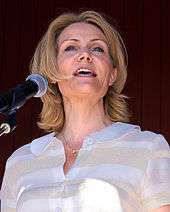
_(cropped).jpg)


